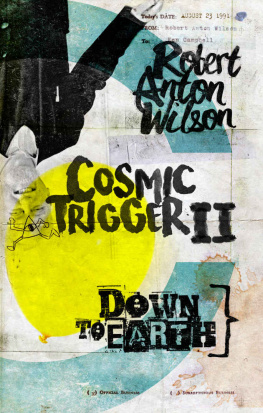Robert Anton Wilson - Prometheus Rising
Here you can read online Robert Anton Wilson - Prometheus Rising full text of the book (entire story) in english for free. Download pdf and epub, get meaning, cover and reviews about this ebook. year: 2016, publisher: Hilaritas Press, genre: Science. Description of the work, (preface) as well as reviews are available. Best literature library LitArk.com created for fans of good reading and offers a wide selection of genres:
Romance novel
Science fiction
Adventure
Detective
Science
History
Home and family
Prose
Art
Politics
Computer
Non-fiction
Religion
Business
Children
Humor
Choose a favorite category and find really read worthwhile books. Enjoy immersion in the world of imagination, feel the emotions of the characters or learn something new for yourself, make an fascinating discovery.
- Book:Prometheus Rising
- Author:
- Publisher:Hilaritas Press
- Genre:
- Year:2016
- Rating:4 / 5
- Favourites:Add to favourites
- Your mark:
- 80
- 1
- 2
- 3
- 4
- 5
Prometheus Rising: summary, description and annotation
We offer to read an annotation, description, summary or preface (depends on what the author of the book "Prometheus Rising" wrote himself). If you haven't found the necessary information about the book — write in the comments, we will try to find it.
Prometheus Rising — read online for free the complete book (whole text) full work
Below is the text of the book, divided by pages. System saving the place of the last page read, allows you to conveniently read the book "Prometheus Rising" online for free, without having to search again every time where you left off. Put a bookmark, and you can go to the page where you finished reading at any time.
Font size:
Interval:
Bookmark:
Rising
Robert Anton Wilson
Introduced by
Israel Regardie
Afterword by
Richard Rasa

Copyright 1983 Robert Anton Wilson
All rights reserved. No part of this book, in part or in whole, may be reproduced, transmitted, or utilized, in any form or by any means, electronic or mechanical, including photocopying, recording, or by any information storage and retrieval system, without permission in writing from the publisher, except for brief quotations in critical articles, books and reviews.
International Standard Book Number: 1-56184-056-4
Library of Congress Catalog Card Number: 83-81665
First Edition 1983
Second Printing 1984, Third Printing 1986
Fourth Printing 1987, Fifth Printing 1989
Sixth Printing 1990, Seventh Printing 1992
Eighth Printing 1994, Ninth Printing 1997
Second Revised Edition (Tenth Printing) 1997
Eleventh Printing 1999, Twelfth Printing 2000
Thirteenth Printing 2001, Fourteenth Printing 2002
Fifteenth Printing 2003, Sixteenth Printing 2004
Seventeenth Printing 2005, Eighteenth Printing 2006
Nineteenth Printing 2007, Twentieth Printing 2008
Twenty-first Printing 2009, Twenty-second Printing 2010
Twenty-third Printing 2012, Twenty-fourth Printing 2013
eBook Version 1.0 2016, Hilaritas Press
Cover Design by amoeba
eBook Design by Pelorian Digital
Hilaritas Press, LLC.
P.O. Box 1153
Grand Junction, Colorado 81502
www.hilaritaspress.com
To
Timothy Leary
&
William S. Burroughs
dove sta memora
The eight-circuit model of consciousness in this book and much of its future-vision derive from the writings of Dr. Timothy Leary, whose letters and conversations have also influenced many other ideas herein. I also owe great debts to Dr. O.R. Bontrager, for introducing me to semantics and communication sciences generally; to R. Buckminister Fuller, for general sociological technological perspectives on current problems; and to all of the following: Barbara Hubbard, Alan Harrington, F.M. Esfandiary, Dr. Paul Watzlavik, Dr. Eric Berne, Dr. Paul Segall, Dr. Israel Regardie, Alvin Toffler, Phil Laut, Dr. Sigmund Freud, Dr. Carl Jung, Alan Watts, Alfred Korzybski, and Aleister Crowley. The members of the Physics/Consciousness Research Group (Dr. Jack Sarfatti, Dr. Nick Herbert and Saul Paul Sirag) have contributed more than is indicated by my few brief references to quantum theory in these pages; they clarified my whole comprehension of epistemology.
None of these persons are responsible for my mistakes or over-statements.
by the author
by Richard Rasa

Screw the government!
Legends of the Fall
Screw the middle class!
Evita
Like most of my books, this text emerged only partly from my conscious design and partly from suspicious accidents. It actually began as a Ph.D. dissertation called The Evolution of Neuro-Sociological Circuits: A Contribution to the Sociobiology of Consciousness, which I wrote in 1978-79 for an alternative university called Paideia. At that time, Paideia ranked as State Approved, the highest rating given to alternative universities in California, where we have alternatives to everything and the state feels required to classify the alternatives on a scale of experimental to totally bonkers. Alas, Paideia, having achieved relative respectability as an alternative, later joined with a much more radical and Utopian outfit, Hawthorn University, and lost its top rank among counter-culture educational contraptions in California, falling from Approved to Authorized, a much lower rating. The whole megillah then joined into several flakey outfits loosely allied, none of which were recognized at all by the state, which suited the new honchos perfectly, since they did not recognize the state either.
In Ireland in 1982, stuck with a dissertation which I liked a lot and a Ph.D. diploma which, due to the collapse of Paideia, looked less impressive, I decided to rewrite the manuscript in more commercial form. The first change consisted of removing all the footnotes (about two of them per sentence) which gave the original a truly academic stink but would annoy the average reader. Then I expressed myself a little more bluntly (and perhaps snidely) in many places, adding much to the humor and nothing to the good taste. I also wrote a few more chapters, created all the exercizes, and sketched out diagrams for the illustrations.
I then, with craft and cunning, removed most of the references to Dr. Timothy Leary from the early parts of the book and only let his name begin to appear frequently after about the middle. I had good reason, based on experience, to feel rather strongly that, just as Dr. Tim was blacklisted by Establishment publishers at that time, any book openly and blatantly based largely on his ideas would also get thrown in the junk heap.
I thought I now had a popular book, and maybe I almost did. The first publisher to whom I submitted it, Jeremy Tarcher, held it for a full year of meditation before rejecting it; his only explanation for the rejection concerned the mixture of technologese and counter culture slang that has since become my most frequent style in nonfiction. (Its based on the way I actually speak.) When I tried Falcon next, they accepted it within 48 hours, and I received the advance check within the next 48 hours. Oh frabjous day!
A month later, I heard from Tarcher again: he had changed his mind and decided he wanted the book after all. I was in one of my periods of acute poverty then (something that happens periodically to all freelance writers) and it was with great effort that I refrained from telling Mr. Tarcher to go fuck himself. I just told him I had a contract with another publisher.
With Falcon as publisher, I then inserted the acknowledgments page, giving Leary the credit he deserved right up front, and added a dedication to him. Falcon, as I expected, did not object. Falcon has always served as an alternative to Establishment publishing, just as Paideia once served as a similar alternative to the academic Establishment.
Prometheus was one of Falcons first books and, I think, the first done with computerized typesetting; as usual with such pioneering efforts, it emerged with a phalanx of typos that have embarrassed me considerably over the years. (When the San Francisco Chronicle first computerized they had similar problems. I remember one story in which the Chief of Police, denouncing drugs, rambled off into a sentence about the thrill of meeting Mickey Mouse and Goofy. I assume that line came from another story but it made the Chief sound as if he had gotten into some weird chemicals himself.) In this edition, I have corrected these errors, where I could find them; I know too much now to think I found all of them. (Wilsons Tenth Law: no matter how many times a writer proofs a book, hostile critics will always find at least one error that he missed.)
I have also updated every place where I thought updating seemed necessary. I even added a few new ideas (which, of course, seem brilliant to me just because they are new) and some new jokes and generally gave the text a badly-needed face-lift. It is still one of my favorite books, and seems to rank high in the estimation of most of my fans.
In Germany-Switzerland-Austria in the late 1980s, three German versions existed simultaneously a deluxe edition from Sphinx Verlag of Zurich, a mass-market paperback from Rowalt Verlag of Hamburg, and an even cheaper pirate edition from the busy troglodytes of the unterwelt. The last, of course, paid no royalties but, by indicating that I had three audiences at three economic levels, persuaded me feel like a very popular writer in Mitteleuropa.
Font size:
Interval:
Bookmark:
Similar books «Prometheus Rising»
Look at similar books to Prometheus Rising. We have selected literature similar in name and meaning in the hope of providing readers with more options to find new, interesting, not yet read works.
Discussion, reviews of the book Prometheus Rising and just readers' own opinions. Leave your comments, write what you think about the work, its meaning or the main characters. Specify what exactly you liked and what you didn't like, and why you think so.












